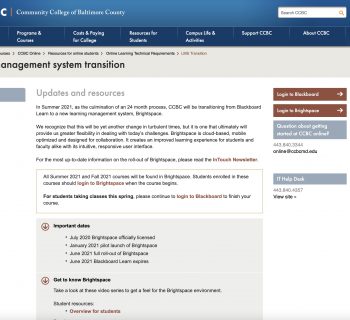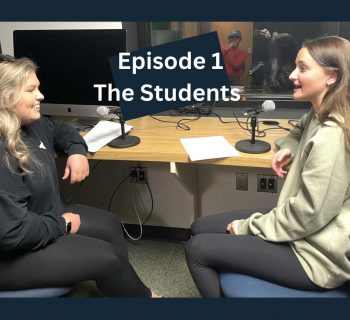Alyssa Gladden
Nursing student Shanaya Hightower angrily stared at her laptop desperately hitting her keys. As
she groans at the screen her laptop alerts her that her battery is low. Sighing in defeat she closes
her computer giving up on the frustrating application for yet another time. This had been her fifth
attempt to complete the seemingly impossible form; the FAFSA.
“I don't understand why it has to be so difficult,” Hightower, a Community College of Baltimore
County nursing student said. “I just want my aid.”
The FAFSA form is one of the critical deciding factors on the amount of aid students all across
the nation receive. For many this form determines whether or not they are able to attend college.
Hightower joins thousands of frustrated students in filling out the form, fighting to get the aid
she needs.
“It was a nightmare. The form was confusing and had tricky questions. I had to visit their office a
bunch of times to get it all sorted out,” Hightower said.
The FAFSA is essentially a governmental application for college students to receive financial
assistance for the cost of their school, such as tuition or book credits. The FAFSA calculates aid
one receives through a series of questions relating to their personal information.
Students have been complaining about the FAFSA application for years. The form seems to
become more difficult and complicated to complete as the years pass by.
“It’s discouraging when you're trying to figure out your financial aid and you keep running into
problems,” Savannah Robinson, Baltimore County Community College student said.
Nasim Keshavarz, The Assistant Director of Financial Aid on The Essex Campus, says that one of the most important pieces of advice for students is to make sure you're reading everything. The questions can be confusing but if students take the time to read everything thoroughly they could avoid a lot
of common mistakes.
In addition to students becoming more and more annoyed with the application process, they also
have an issue with the aid they receive. Recently many have been complaining about how the aid is
calculated and distributed.
Students who are middle class, two income households, especially have felt that the application
doesn’t account for important aspects of their lives.
“More scholarships need to go to middle class,” Kali Armstrong, University of Oklahoma
student tweeted. “FAFSA acts like my parents don’t have a house and other bills to pay.”
Middle class students, like Armstrong, feel as if the FAFSA is unfairly judging their income base,
giving them less aid than they deserve. Having a higher household income typically decreases
the aid that one receives.
But what about for the other additional charges a middle class family may have such as mortgages, car payments, or other children to provide for? What about having multiple children in college? Does FAFSA
really account for all of these things?
“Your adjust to growth income does play apart of it,” Keshavarz said. “When FAFSA is doing a calculation it divides the number of how many people (in the household) are in college. It’s not as simple as saying 'this is our income.'”
Even with FAFSA accounting for other aspects in a student's life many are still unhappy
for an interesting reason often asking themselves, "what if my parents aren’t helping me pay for college?"
A lot of students don’t think they receive the right amount of aid by having their entire household income provided for the award. Why should anyone’s other than their own income be included if they’re
paying for their college entirely by themselves?
Some of the questions FAFSA asks are included in the section they call the dependency status
section. This section asks you a series of questions that ultimately determine if you are a
dependent or independent student. The key difference between the two is as an independent
student you do not have to provide your parent's or guardian's information, meaning your aid is
not affected by how much they make.
How can you become an independent student? According to the FAFSA website you have to
meet several qualifications such as being married, having children, being in foster care, being a
grad student, and many other requirements. Unfortunately if you don’t meet these standards you
automatically become a dependent student and your entire household income begins to play apart in
determining your aid base.
Students argue is this process really fair? What if they don’t fit into these strict categories but
still feel as they should be labeled as an independent student?
“If a student does sit in a grey area the federal government gives us the opportunity to conduct a
‘dependency override’,” Keshavarz said. “Once we feel comfortable about putting a student in an
independent status we will at that time.”
A dependency override may seem like an easy fix to a difficult problem but this process comes
with a lot of hard work and may not be accessible to everyone.
According to Keshavarz the dependency override option is only available in extreme situations.
Situations where there are serious issues happening like physical or mental abuse in the family. It
requires a lot of documentation with people who can support whats going on.
Even though a dependency override may not be for everyone there are other options to help
students get the aid they need.
CCBC offers a wide variety of scholarships and grants including the Pell Grant and the
Baltimore County Promise. Students can go to CCBC’s website to fill out any of the various
financial opportunities.
The FAFSA is a headache all students have to go through every year. Knowing what you're doing
and all your options can help you get the most out of your aid. If you’re still having problems
visit the the financial aid office they’re there to help.















Alyssa,
This was a great article. Thank you for proving a student view of this important issue.
I am hopeful that we can change this broken system. Many people are working on it – I’d suggest reading this article, by Sara Goldrick-Rab, who is a leading voice in the movement to build a higher education system that works for our students.
https://medium.com/@saragoldrickrab/when-is-financial-aid-simplification-a-game-changer-and-when-is-it-just-a-game-c092ec620fad
As she mentions, College Promise programs – like the ones we are starting to roll out here at CCBC – are an important part in making this better.
Thanks again for the great article. Look forward to more.
-Kyle Goehner, Associate Professer CCBC
I definitely agree with this article. Filling out the FAFSA is not my favorite time of the year. Although, I have noticed that the FASFA form has included some changes. One of them is having last aid year’s information on file and just needing to add any changes for returning users. Even still, I agree with the statements made in this article. Students both want and need an easier way to fill out the FAFSA and get the aid they deserve. I can only hope that schools with new technology and with listening to students’ feedback, the financial aid process will improve. Hopefully, the FAFSA will get easier to use, fill out, and get a wider variety of aid for students.
I really agree with this article. I have had so many issues trying to fill out the FAFSA that I just gave up on it. I am lucky enough to be able to afford it, but I know there are many people out there who can’t afford to pay for college on their own. I enjoyed the author’s lead. I felt as if the lead helped to set up the rest of the article very well. The article also has a very nice flow of information that makes it easy to read.
As someone who may be relying on student aid in the future, this article on the complications of dealing with FAFSA paperwork was pretty relatable. Alyssa Gladden did a great job of incorporating quotes from a variety of sources that really helped to build the story. It really is a shame that students simply seeking to pursue an education have such a difficult time requesting and receiving the financial aid they need. While I know about the nationwide issue of student loan debt, I hadn’t heard much about the struggle to even obtain aid in the first place. Along with covering some of the details regarding specific challenges students can run into, I also appreciate that Gladden includes advice and possible resources that interested students can investigate.
This is a great article!
I totally agree with this article. This is also reminded that time when the first time I applied the FAFSA application which I had to go through lots of questions and answers which irritated me so many times as well. The article speaks about the voice of those students who can’t easily afford the college fees and even when they try to fill up it’s requirements then makes them so confusing. I really enjoyed that article mentioned about the situation of those students who they really need it.
I totally agree with this article! I personally know the struggle of having to fill out the FAFSA and it is no fun. I like how it gives you possible resources to help you better navigate the FAFSA application and website.